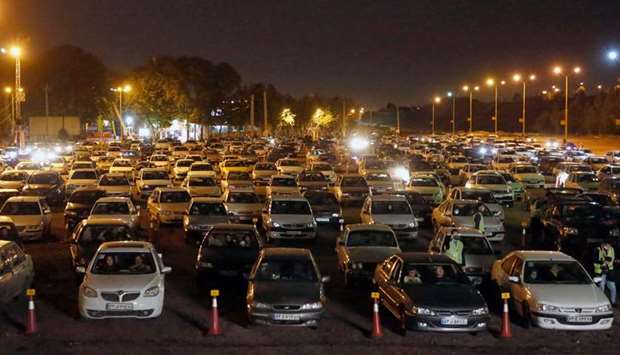With mosques in Iran closed as it battles the coronavirus, worshippers have adopted the novel solution of getting behind the wheel at drive-ins to gather during the fasting month of Ramadan.
Gatherings have been banned as part of Iran’s efforts to eliminate Covid-19, the disease that has claimed the lives of more than 6,000 people in the Islamic republic.
Deprived of the opportunity to pray at mosques following iftar, the meal breaking the Ramadan fast, families are jumping into their cars to attend drive-in religious ceremonies.
The novelty of drive-ins, or watching movies from the comfort of one’s own car, is an American cultural phenomenon that never really took off in Iran.
But at a car park in Tehran on Thursday night, more than 100 cars were assembled in front of a giant screen to follow a religious ceremony.
“During this quarantine with mosques closed, we really missed (religious) ceremonies,” said Fatemeh, a chador-clad woman sitting in one of the cars with her family.
“When I read on Instagram that this had been set up, I found it to be really creative and beautiful,” said the 28-year-old public servant.
Attendants guided cars towards designated spots facing a giant, retrofitted screen at Eram Amusment Park in the west of the capital.
Called the “Nights of Longing”, the ceremony started with a music video showing the funeral of top Iranian general Qasem Soleimani, who was killed in a US drone strike in neighbouring Iraq in January.
In front of the rows of cars, men with loose-fitting surgical masks stood on a stage singing chants, their image projected onto the screen behind them.
Young families sat inside the cars, their faces glowing in the dark from the bright screen.
The orange indicator lights of the cars flashed on and off as children peeked out of sunroofs to get a better view.
The coronavirus outbreak has killed 6,091 people and infected 95,646 since Iran announced its first cases on February 19.
Those were the deaths of two people in the shrine city of Qom, a centre for Islamic studies and pilgrims from across the region.
It was not until mid-March that mosques were closed and Friday prayers suspended in a bid to stop the spread of the virus. For the worshippers, the drive-in was an opportunity to get back to the normal way of things without disregarding social distancing.
“I believe this creative solution is a real example of crisis management, and a beautiful one,” said Mohamed, a teacher attending with his wife and son.
“With many deprived of what they wished for and dreamt of, (the organisers) made it possible for them to be here,” he said.

Iranians sit in their vehicles while taking part in a religious ceremony during the holy month of Ramadan in a parking area of Tehran’s Eram park
